肖特基二极管讲解
肖特基二极管理想因子

肖特基二极管理想因子肖特基二极管是一种常用的电子元件,其特殊的结构和性质使其在各种电路中起到重要的作用。
本文将从肖特基二极管的基本原理、特点、应用领域等方面进行介绍和分析。
一、肖特基二极管的基本原理肖特基二极管是由P型半导体和金属材料构成的,其结构与普通的PN结二极管有很大的区别。
肖特基二极管的P型半导体与金属材料之间形成了一个肖特势垒,这个肖特势垒可以阻止电流的正向传导。
当外加正向电压时,P型半导体的空穴会被金属吸收,形成一个空穴井,从而阻止电流的流动。
而当外加反向电压时,P型半导体与金属之间的肖特势垒减小,电流可以顺利通过。
这种特殊的结构使得肖特基二极管在电路中具有很多特殊的性质和应用。
二、肖特基二极管的特点1. 低电压损耗:肖特基二极管的正向压降较小,一般在0.2V左右,远低于普通二极管的0.6V。
这使得肖特基二极管在低电压电路中具有较低的功耗和较高的效率。
2. 快速开关速度:由于肖特基二极管的电荷注入和排出速度较快,其开关速度比普通二极管更快。
这使得肖特基二极管在高频电路中表现出较好的性能。
3. 低反向漏电流:肖特基二极管的反向漏电流较小,一般在nA级别。
这使得肖特基二极管在电路中具有较好的稳定性和可靠性。
4. 温度稳定性好:肖特基二极管的温度特性与普通二极管不同,其正向压降与温度变化的关系较小。
这使得肖特基二极管在高温环境中能够保持较好的性能。
三、肖特基二极管的应用领域1. 电源管理:由于肖特基二极管的低电压损耗和快速开关速度,它被广泛应用于电源管理电路中,用于提高电源转换效率和减小功耗。
2. 高频电路:肖特基二极管的快速开关速度和低反向漏电流使其在高频电路中表现出较好的性能,常用于射频放大器、混频器等电路中。
3. 模拟电路:由于肖特基二极管的特殊性质,它在模拟电路中具有独特的应用。
例如,肖特基二极管可以作为电流源、电压参考源等。
4. 信号检测:肖特基二极管具有较低的正向压降和快速开关速度,可以用于信号检测电路中,例如低压检测、功率放大等。
肖特基(SCHOTTKY)系列二极管

肖特基(SCHOTTKY)系列二极管本文主要介绍济南半导体所研制生产的肖特基二极管系列产品。
介绍军品级、工业品级肖特基二极管的种类、性能特点、正反向电参数。
对产品的正向直流参数、反向温度特性及正向、反向抗烧毁能力等进行了质量分析,并与国外公司制造的同类产品进行了比较。
最后,着重介绍了2DK030高可靠肖特基二极管的性能特点用途,1N60超高速肖特基二极管的性能特点用途,以及功率肖特基二极管在开关电源方面的应用。
本文主要包括下面六个部分:一.肖特基二极管简介二.我所肖特基二极管生产状况三.我所肖特基二极管种类四.我所肖特基二极管的特点及性能质量分析五.介绍我所生产的两种肖特基二极管(1)2DK030高可靠肖特基二极管(2)1N60超高速肖特基二极管六.功率肖特基二极管在开关电源方面的应用下面只对部分常用的参数加以说明(1) V F正向压降Forward Voltage Drop(2) V FM最大正向压降Maximum Forward Voltage Drop(3) V BR反向击穿电压Breakdown Voltage(4) V RMS能承受的反向有效值电压RMS Input Voltage(5) V RWM 反向峰值工作电压Working Peak ReverseVoltage(6) V DC最大直流截止电压Maximum DC BlockingVoltage(7) T rr反向恢复时间Reverse Recovery Time(8) I F(AV)正向电流Forward Current(9) I FSM最大正向浪涌电流Maximum Forward SurgeCurrent(10) I R反向电流Reverse Current(11) T A环境温度或自由空气温度Ambient Temperature(12) T J工作结温Operating Junction Temperature(13) T STG储存温度Storage Temperature Range(16) T C管子壳温Case Temperature一.肖特基二极管简介:同普通硅二极管一样,肖特基二极管也是具有单向导电特性的硅二极管。
0.3v肖特基二极管

0.3v肖特基二极管肖特基二极管是一种特殊的二极管,也称为肖特基势垒二极管或肖特基结二极管。
它在电子元器件中起到了非常重要的作用。
下面我将对肖特基二极管进行详细介绍,并讨论它的特性、工作原理以及在实际应用中的一些注意事项。
肖特基二极管由金属和半导体材料组成,金属为阳极,半导体为阴极。
和普通的二极管不同的是,肖特基二极管的PN结是由金属和P型半导体直接接触而成,而不是用N型半导体作为P型半导体的掺杂源。
肖特基二极管的主要特性如下:1. 低反向击穿电压:与其他二极管相比,肖特基二极管的反向击穿电压较低,在0.1V附近。
2. 快速开关速度:肖特基二极管的内部结构和材料使其具有快速的开关特性,从而能够快速地响应信号变化。
3. 低漏电流:在正向偏置下,肖特基二极管的漏电流较低。
4. 低容焦耳电压:肖特基二极管具有低电容焦耳电压,有利于高频应用。
肖特基二极管的工作原理是基于热发射效应。
当金属与P型半导体接触时,存在势垒,该势垒能够让电子轻易地穿过,形成势垒注入。
而当外加正向电压时,势垒宽度减小,增加了注入电子的能量,加快了电流的流动速度。
肖特基二极管主要用于以下几个方面:1. 高频应用:由于肖特基二极管具有快速开关速度和低电容焦耳电压等优点,因此被广泛应用于高频电路中,如射频放大器、混频器等。
2. 低功耗应用:肖特基二极管的低漏电流特性使其成为低功耗应用的理想选择,如低功耗电源管理和电池驱动设备等。
3. 光电转换器:肖特基二极管的特性和结构使其适用于光电转换器。
它可以将光信号转换为电信号,用于光通信和光检测等应用。
4. 触发器和开关:肖特基二极管的快速开关能力使其适用于触发器和开关电路。
它可以将信号切换得非常迅速和精确,满足高速数据处理和控制的需求。
当使用肖特基二极管时,需要注意以下几点:1. 反向电压:由于肖特基二极管的反向击穿电压较低,所以在使用时需要注意控制反向电压,避免击穿和损坏。
2. 温度效应:肖特基二极管的性能受到温度的影响较大,温度过高会导致性能的下降,因此需要注意散热和温度控制。
二极管 mos管 肖特基二极管
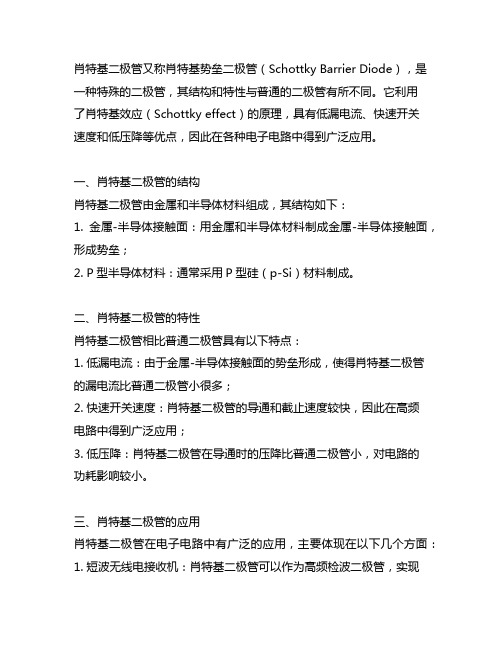
肖特基二极管又称肖特基势垒二极管(Schottky Barrier Diode),是一种特殊的二极管,其结构和特性与普通的二极管有所不同。
它利用了肖特基效应(Schottky effect)的原理,具有低漏电流、快速开关速度和低压降等优点,因此在各种电子电路中得到广泛应用。
一、肖特基二极管的结构肖特基二极管由金属和半导体材料组成,其结构如下:1. 金属-半导体接触面:用金属和半导体材料制成金属-半导体接触面,形成势垒;2. P型半导体材料:通常采用P型硅(p-Si)材料制成。
二、肖特基二极管的特性肖特基二极管相比普通二极管具有以下特点:1. 低漏电流:由于金属-半导体接触面的势垒形成,使得肖特基二极管的漏电流比普通二极管小很多;2. 快速开关速度:肖特基二极管的导通和截止速度较快,因此在高频电路中得到广泛应用;3. 低压降:肖特基二极管在导通时的压降比普通二极管小,对电路的功耗影响较小。
三、肖特基二极管的应用肖特基二极管在电子电路中有广泛的应用,主要体现在以下几个方面:1. 短波无线电接收机:肖特基二极管可以作为高频检波二极管,实现无线电信号的检波和解调;2. 低功耗电路:由于肖特基二极管的低漏电流和低压降特性,适合用于设计低功耗的电路;3. 微波频率倍频器:肖特基二极管在微波频率电路中具有较高的性能,常被用作频率倍增器;4. 太阳能电池:肖特基二极管作为太阳能电池的组成部分,可以将光能转化为电能。
四、肖特基二极管与MOS管的比较肖特基二极管与MOS管(金属-氧化物-半导体场效应晶体管)是两种不同类型的半导体器件,它们在结构和特性上有所不同。
1. 结构:肖特基二极管由金属和P型半导体材料组成,而MOS管由金属氧化物和半导体材料组成。
2. 功能:肖特基二极管主要用于整流和高频开关电路中,而MOS管主要用于放大和开关电路中。
3. 特性:肖特基二极管的优点在于低漏电流和快速开关速度,但其直流特性和温度特性较差;MOS管的特点在于良好的输入输出特性和高集成度,但功耗较大。
肖特基二极管种类

肖特基二极管种类1. 介绍肖特基二极管是一种特殊的二极管,由于其特殊的结构和性能,在电子领域中得到广泛应用。
它是由肖特基结构组成,与普通的PN结二极管相比,具有更低的正向电压降和更快的开关速度。
肖特基二极管的种类繁多,本文将介绍其中几种常见的肖特基二极管。
2. 基本结构肖特基二极管的基本结构由P型半导体和金属材料组成。
在P型半导体中,掺杂有较高浓度的杂质,形成P+区域。
金属材料被放置在P+区域上,形成金属与P+区域之间的肖特基结。
这种结构使得肖特基二极管具有以下特点:•正向电压降较低:由于肖特基结的形成,肖特基二极管的正向电压降比普通二极管要低。
•快速开关速度:肖特基二极管的载流子注入和排出速度较快,使其具有较快的开关速度。
•低反向电流:由于肖特基结的存在,肖特基二极管的反向电流较低。
3. 常见种类3.1 肖特基二极管肖特基二极管是最基本的肖特基二极管种类,也是最常见的一种。
它由一个P型半导体和一个金属材料组成。
肖特基二极管的正向电压降一般在0.2V左右,具有较快的开关速度和较低的反向电流。
3.2 超快肖特基二极管超快肖特基二极管是一种具有更快开关速度的肖特基二极管。
它通过优化肖特基结的设计,减小结内电容和电阻,从而实现更快的开关速度。
超快肖特基二极管广泛应用于高频电路和快速开关电路中。
3.3 高压肖特基二极管高压肖特基二极管是一种具有较高反向击穿电压的肖特基二极管。
它通过控制肖特基结的形成和材料的选择,实现较高的反向击穿电压。
高压肖特基二极管常用于高压电源和电磁干扰保护电路中。
3.4 低压肖特基二极管低压肖特基二极管是一种具有较低正向电压降的肖特基二极管。
它通过优化肖特基结的材料和结构,实现较低的正向电压降。
低压肖特基二极管常用于低功耗电路和电池供电电路中。
4. 应用领域肖特基二极管由于其独特的特性,在许多领域中得到广泛应用。
以下是几个常见的应用领域:•电源管理:肖特基二极管可以用于电源开关、反向电流保护和电源选择等方面,提高电源管理的效率和可靠性。
肖特基(Schottky)二极管
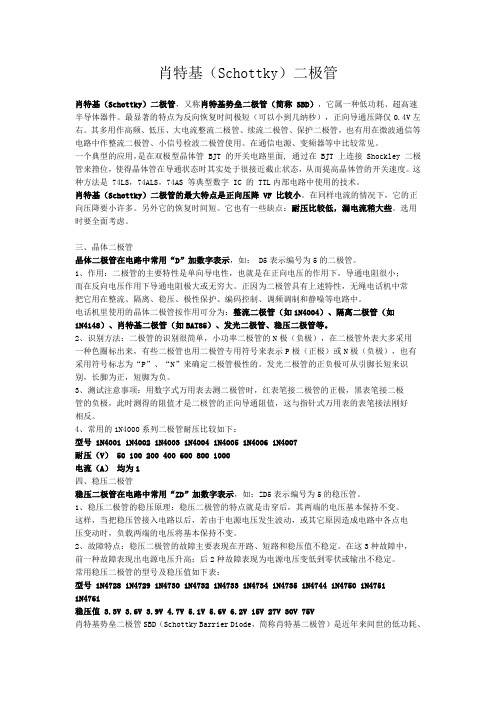
肖特基(Schottky)二极管肖特基(Schottky)二极管,又称肖特基势垒二极管(简称 SBD),它属一种低功耗、超高速半导体器件。
最显著的特点为反向恢复时间极短(可以小到几纳秒),正向导通压降仅0.4V左右。
其多用作高频、低压、大电流整流二极管、续流二极管、保护二极管,也有用在微波通信等电路中作整流二极管、小信号检波二极管使用。
在通信电源、变频器等中比较常见。
一个典型的应用,是在双极型晶体管 BJT 的开关电路里面, 通过在 BJT 上连接 Shockley 二极管来箝位,使得晶体管在导通状态时其实处于很接近截止状态,从而提高晶体管的开关速度。
这种方法是 74LS,74ALS,74AS 等典型数字 IC 的 TTL内部电路中使用的技术。
肖特基(Schottky)二极管的最大特点是正向压降 VF 比较小。
在同样电流的情况下,它的正向压降要小许多。
另外它的恢复时间短。
它也有一些缺点:耐压比较低,漏电流稍大些。
选用时要全面考虑。
三、晶体二极管晶体二极管在电路中常用“D”加数字表示,如: D5表示编号为5的二极管。
1、作用:二极管的主要特性是单向导电性,也就是在正向电压的作用下,导通电阻很小;而在反向电压作用下导通电阻极大或无穷大。
正因为二极管具有上述特性,无绳电话机中常把它用在整流、隔离、稳压、极性保护、编码控制、调频调制和静噪等电路中。
电话机里使用的晶体二极管按作用可分为:整流二极管(如1N4004)、隔离二极管(如1N4148)、肖特基二极管(如BAT85)、发光二极管、稳压二极管等。
2、识别方法:二极管的识别很简单,小功率二极管的N极(负极),在二极管外表大多采用一种色圈标出来,有些二极管也用二极管专用符号来表示P极(正极)或N极(负极),也有采用符号标志为“P”、“N”来确定二极管极性的。
发光二极管的正负极可从引脚长短来识别,长脚为正,短脚为负。
3、测试注意事项:用数字式万用表去测二极管时,红表笔接二极管的正极,黑表笔接二极管的负极,此时测得的阻值才是二极管的正向导通阻值,这与指针式万用表的表笔接法刚好相反。
肖特基整流二极管介绍
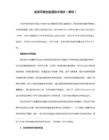
肖特基整流二极管介绍一、引言肖特基势垒二极管(Schottky barrier diode简称SBD)是一种金属(或金属硅化物)/ 半导体接触的器件,它是多子器件,主要用其非线性电阻的特性。
SBD是最古老的半导体器件,1904年开始,矿石检波器就得到了应用。
SBD在超高频及微波电路中用于检波和混频,都是用其正向非线性电阻的特性。
SBD长期用金属与半导体接触进行制作,稳定性差,是可靠性最差的半导体器件之一。
八十年代开始对金属硅化物深入研究,用金属硅化物代替金属,获得了可靠而又重复的肖特基势垒,为大规模生产奠定了基础。
各种家用电器、微电脑、汽车电子、通讯设备、仪器、国防军工都要求电子设备轻量化、小型化,特别是要求采用小型化和高效率的电源。
高频开关电源随着工作频率的提高,其体积和重量都会明显减小,同时效率显著提高,高频开关电源越来越受到人们的重视。
SBD 有三大特点:(1)速度快(多子器件,无少子储存效应);(2)正向压降低;(3)散热性能好。
SBD与通常的PN结整流器件相比,SBD具有开关速度快(高频)、导通电压低(高效)、抗电流浪涌冲击能力强(大电流)。
低输出电压(V0≤±24V)的高频开关电源多采用肖特基整流二极管。
世界高频开关电源年销售额约为500亿美圆,这是一个巨大的市场!对肖特基整流二极管的规模生产有巨大的拉动力。
SBD制作简单、工艺流程短、成本低、有利于大规模生产。
肖特基整流二极管在高频开关电源电路中起开关作用,是用其正、反向非线性电阻的特性(不再只是用正向非线性电阻的特性)。
肖特基整流二极管的名称较多,有功率肖特基二极管、肖特基续流二极管、大电流肖特基二极管、肖特基开关二极管等等。
肖特基势垒与p-n结的比较肖特基二极管的势垒可以比做在同一种半导体上的p-n结低许多,例如硅,p-n结的内建势V bi≥0.8V;而肖特基结势垒电势为0.5V~0.6V很容易做到。
在同一电流密度下,p-n结上的正向压降比肖特基二极管上的电压降至少高0.3V。
肖特基二极管原理及作用

肖特基二极管原理及作用一、肖特基二极管的原理1.肖特基结的形成肖特基二极管的肖特基结是由金属与N型半导体直接接触形成的。
当金属与N型半导体接触时,金属中的自由电子会扩散到N型半导体中,形成一个电子云区域。
云区域内的电子与N型半导体中的电子进行复合,形成静电势垒。
这种结构不同于普通二极管中由P型半导体和N型半导体结合形成的肖特基结。
2.肖特基结的特性肖特基结的最大特点是具有快速恢复的特性。
普通二极管在正向工作时需要一定的时间才能从导通状态恢复到截止状态,而肖特基二极管在反向击穿截止后可以非常快速的恢复到被反偏截止状态。
这是由于肖特基结中金属与半导体的接触,使得电子从金属向半导体中迅速传输形成的。
3.肖特基二极管的电流特性与普通二极管相比,肖特基二极管的正向电流较大,而反向电流较小。
这是由于肖特基二极管的肖特基结中的电子云区域能够有效降低正向导通和反向击穿时的电流,从而提高了正向电流和反向电流的工作范围。
二、肖特基二极管的作用1.电源保护2.稳压和恒流源肖特基二极管的电流特性使其可以用于稳压和恒流源电路的设计。
在稳压电路中,肖特基二极管可以配合稳压二极管使用,提供更加精确的输出电压。
在恒流源电路中,通过利用肖特基二极管的电流特性,可以设计出稳定的恒流源。
这些应用都有助于提高电路的稳定性和可靠性。
3.混频器由于肖特基二极管的快速开关特性和较低的正向电压,可以用于射频(Radio Frequency,RF)混频器的设计。
混频器是一种常用于无线通信中的电路,用于将两个不同频率的信号进行混合,产生新的频率信号。
肖特基二极管可以在高频信号的开关过程中提供较小的非线性失真和较低的功耗,从而提高混频器的性能。
进一步推广,肖特基二极管在太阳能电池、红外线传感器等领域也有着重要应用,通过合理地利用肖特基二极管的特性,可以提高电路性能、降低功耗、增强功能等。
肖特基二极管与普通二极管的区别
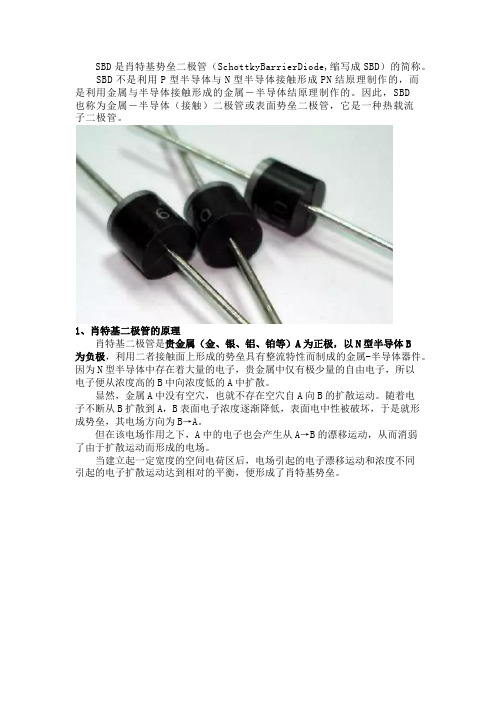
SBD是肖特基势垒二极管(SchottkyBarrierDiode,缩写成SBD)的简称。
SBD不是利用P型半导体与N型半导体接触形成PN结原理制作的,而是利用金属与半导体接触形成的金属-半导体结原理制作的。
因此,SBD也称为金属-半导体(接触)二极管或表面势垒二极管,它是一种热载流子二极管。
1、肖特基二极管的原理肖特基二极管是贵金属(金、银、铝、铂等)A为正极,以N型半导体B为负极,利用二者接触面上形成的势垒具有整流特性而制成的金属-半导体器件。
因为N型半导体中存在着大量的电子,贵金属中仅有极少量的自由电子,所以电子便从浓度高的B中向浓度低的A中扩散。
显然,金属A中没有空穴,也就不存在空穴自A向B的扩散运动。
随着电子不断从B扩散到A,B表面电子浓度逐渐降低,表面电中性被破坏,于是就形成势垒,其电场方向为B→A。
但在该电场作用之下,A中的电子也会产生从A→B的漂移运动,从而消弱了由于扩散运动而形成的电场。
当建立起一定宽度的空间电荷区后,电场引起的电子漂移运动和浓度不同引起的电子扩散运动达到相对的平衡,便形成了肖特基势垒。
典型的肖特基整流管的内部电路结构是以N型半导体为基片,在上面形成用砷作掺杂剂的N-外延层。
阳极使用钼或铝等材料制成阻档层。
用二氧化硅(SiO2)来消除边缘区域的电场,提高管子的耐压值。
N型基片具有很小的通态电阻,其掺杂浓度较H-层要高100%倍。
在基片下边形成N+阴极层,其作用是减小阴极的接触电阻。
通过调整结构参数,N型基片和阳极金属之间便形成肖特基势垒,如图所示。
当在肖特基势垒两端加上正向偏压(阳极金属接电源正极,N型基片接电源负极)时,肖特基势垒层变窄,其内阻变小;反之,若在肖特基势垒两端加上反向偏压时,肖特基势垒层则变宽,其内阻变大。
综上所述,肖特基整流管的结构原理与PN结整流管有很大的区别通常将PN结整流管称作结整流管,而把金属-半导管整流管叫作肖特基整流管,采用硅平面工艺制造的铝硅肖特基二极管也已问世,这不仅可节省贵金属,大幅度降低成本,还改善了参数的一致性。
肖特基二极管简介

BTA54C BTA54SDO41SCHOTTKY:取第一个字母“S”,SMD:Surface Mounted Devices的缩写,意为:表面贴装器件,取第一个字母“S”,上面两个词组各取第一个字母、即为SS,同普通硅二极管一样,肖特基二极管也是具有单向导电特性的硅二极管。
不同的是,普通二极管的工作是利用半导体PN结的单向导电特性,而肖特基二极管则是利用金属和半导体接触产生的势垒而起到单向导电作用,它在开关没有时存储电荷和移动效应。
所以,肖特基二极管的开关速度非常快,反向恢复时间t rr很短(小于几十ns);同时,其正向压降V F较小,尤其适用于高速开关电路和低压大电流输出电路,具有较高的整流效率和可靠性。
这是肖特基二极管的两大优点,但肖特基二极管也有两个缺点,一是反向耐压V R较低,二是反向漏电流I R较大。
肖特基的最高电压是200V,也就是说,肖特基的极限电压是200V。
超过200V电压的也必定是模块。
电流越大,电压越低。
与可控硅元件不一样。
电流与电压成反比(模块除外)。
10A、20A、30A规格的有做到200V电压。
电流最小的肖特基是BAT42(0.2A);BAT54、BAT54A、BAT54C(0.3A);电流最大的肖特基是440A,如:440CMQ030、444CNQ045;超过440A的必定是模块。
关于肖特基MBR系列为什么国际通用常见的肖特基二极管都以“MBR”字头命名?因为最早是摩托罗拉产品型号M:是以最早MOTOROLA的命名,取MB:Bridge 桥;Barrier:势垒R:Rectifier,整流器“MBR”意为整流器件例如:MBR10200CTM:MOTOROLA 缩写MB:Barrier缩写BR:Rectifier 缩写R10:电流10A200:电压200VC:表示TO-220AB封装,常指半塑封。
T:表示管装MBR1045CT,其中的“C”:表示TO-220封装;MBR6045PT,其中的“P”:表示TO-3P封装元件的封装形式也在型号的前缀第四位字母中体现,例如:MBRD10100CT:第四位的D,表示贴片DPAK封装,即TO-252MBRB10100CT:第四位的B,表示贴片D2PAK封装,即TO-263MBRF10100CT:第四位的F,表示TO-220F全塑封MBR、SR、SL、SB、STB、STP都是常见的半导体公司对肖特基产品的型号命名。
20a肖特基二极管
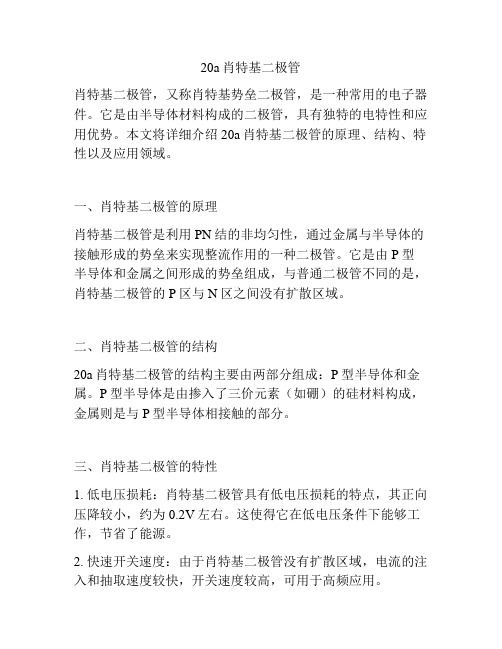
20a肖特基二极管肖特基二极管,又称肖特基势垒二极管,是一种常用的电子器件。
它是由半导体材料构成的二极管,具有独特的电特性和应用优势。
本文将详细介绍20a肖特基二极管的原理、结构、特性以及应用领域。
一、肖特基二极管的原理肖特基二极管是利用PN结的非均匀性,通过金属与半导体的接触形成的势垒来实现整流作用的一种二极管。
它是由P型半导体和金属之间形成的势垒组成,与普通二极管不同的是,肖特基二极管的P区与N区之间没有扩散区域。
二、肖特基二极管的结构20a肖特基二极管的结构主要由两部分组成:P型半导体和金属。
P型半导体是由掺入了三价元素(如硼)的硅材料构成,金属则是与P型半导体相接触的部分。
三、肖特基二极管的特性1. 低电压损耗:肖特基二极管具有低电压损耗的特点,其正向压降较小,约为0.2V左右。
这使得它在低电压条件下能够工作,节省了能源。
2. 快速开关速度:由于肖特基二极管没有扩散区域,电流的注入和抽取速度较快,开关速度较高,可用于高频应用。
3. 低反向漏电流:肖特基二极管具有较低的反向漏电流,可有效减少功耗。
4. 温度稳定性好:肖特基二极管的温度稳定性较好,不易受温度变化影响。
四、肖特基二极管的应用领域1. 电源管理:由于肖特基二极管具有低电压损耗和快速开关速度的特点,常用于电源管理电路中,如DC-DC转换器、逆变器等。
2. 高频应用:肖特基二极管的快速开关速度使其适用于高频应用,如射频前端、无线通信等。
3. 模拟电路:肖特基二极管具有低反向漏电流和温度稳定性好的特点,适合用于模拟电路中,如放大器、滤波器等。
4. 汽车电子:肖特基二极管在汽车电子领域有广泛应用,如发动机控制单元、ABS系统等。
总结:20a肖特基二极管是一种具有独特电特性和应用优势的电子器件。
它通过利用PN结非均匀性和金属与半导体的接触形成势垒来实现整流作用。
具有低电压损耗、快速开关速度、低反向漏电流和温度稳定性好等特点。
在电源管理、高频应用、模拟电路和汽车电子等领域有广泛应用。
肖特基二极管讲解

肖特基二极管简介肖特基二极管(SBD)是肖特基势垒二极管(SchottkyBarrierDiode,缩写成SBD)的简称,是以其发明人肖特基博士(Schottky)命名的半导体器件。
肖特基二极管是低功耗、大电流、超高速半导体器件,它不是利用P型半导体与N型半导体接触形成PN结原理制作的,而是利用金属与半导体接触形成的金属-半导体结原理制作的。
因此,SBD也称为金属-半导体(接触)二极管或表面势垒二极管,它是一种热载流子二极管。
Schottky diode (SBD) is the Schottky barrier diode , is the inventor of the Schottky named semiconductor device. Schottky barrier diode is a low power, high current, super high speed semiconductor devices, instead of using P type semiconductor and the n-type semiconductor contact formation PN junction theory to make, but the use of metal semiconductor contact formation of metal semiconductor junction with the principle of making the. Therefore, SBD is also known as a metal semiconductor (contact) diode or a surface barrier diode, which is a hot carrier diode.肖特基二极管是半导体器件,以其发明人博士(1886年7月23日—1976年3月4日)命名的,SBD是肖特基势垒二极管(SchottkyBarrierDiode,缩写成SBD)的简称。
肖特基二极管整流
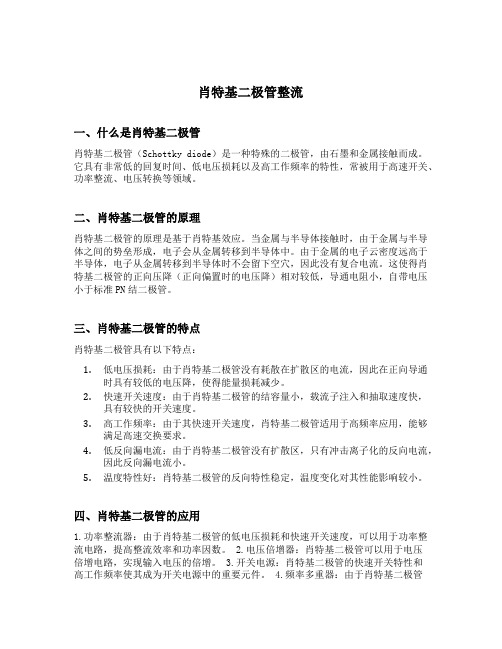
肖特基二极管整流一、什么是肖特基二极管肖特基二极管(Schottky diode)是一种特殊的二极管,由石墨和金属接触而成。
它具有非常低的回复时间、低电压损耗以及高工作频率的特性,常被用于高速开关、功率整流、电压转换等领域。
二、肖特基二极管的原理肖特基二极管的原理是基于肖特基效应。
当金属与半导体接触时,由于金属与半导体之间的势垒形成,电子会从金属转移到半导体中。
由于金属的电子云密度远高于半导体,电子从金属转移到半导体时不会留下空穴,因此没有复合电流。
这使得肖特基二极管的正向压降(正向偏置时的电压降)相对较低,导通电阻小,自带电压小于标准PN结二极管。
三、肖特基二极管的特点肖特基二极管具有以下特点:1.低电压损耗:由于肖特基二极管没有耗散在扩散区的电流,因此在正向导通时具有较低的电压降,使得能量损耗减少。
2.快速开关速度:由于肖特基二极管的结容量小,载流子注入和抽取速度快,具有较快的开关速度。
3.高工作频率:由于其快速开关速度,肖特基二极管适用于高频率应用,能够满足高速交换要求。
4.低反向漏电流:由于肖特基二极管没有扩散区,只有冲击离子化的反向电流,因此反向漏电流小。
5.温度特性好:肖特基二极管的反向特性稳定,温度变化对其性能影响较小。
四、肖特基二极管的应用1.功率整流器:由于肖特基二极管的低电压损耗和快速开关速度,可以用于功率整流电路,提高整流效率和功率因数。
2.电压倍增器:肖特基二极管可以用于电压倍增电路,实现输入电压的倍增。
3.开关电源:肖特基二极管的快速开关特性和高工作频率使其成为开关电源中的重要元件。
4.频率多重器:由于肖特基二极管的高工作频率,可以用于频率多重器,将输入信号的频率倍增。
5.调制解调器:肖特基二极管可以用于调制解调器中的整流和检波。
6.高频放大器:由于肖特基二极管的低噪声和高频特性,适用于高频放大器。
五、肖特基二极管的选型和应用注意事项选用肖特基二极管时,需要考虑以下因素:1.导通电压降:根据具体应用需求选择合适的导通电压降,以确保电路正常工作。
肖特基二极管的原理和封装介绍
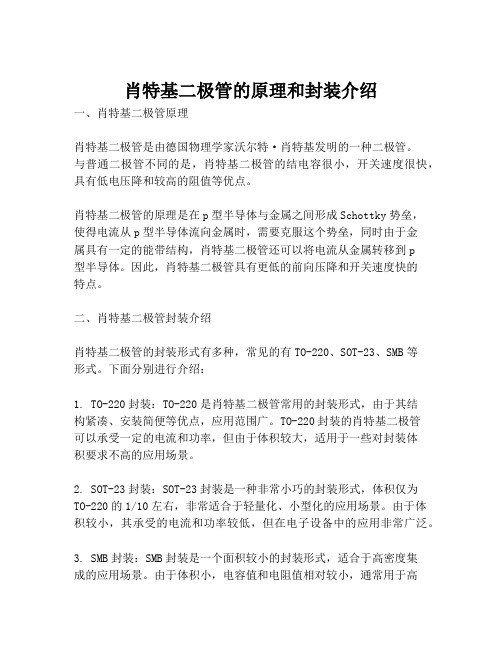
肖特基二极管的原理和封装介绍一、肖特基二极管原理肖特基二极管是由德国物理学家沃尔特·肖特基发明的一种二极管。
与普通二极管不同的是,肖特基二极管的结电容很小,开关速度很快,具有低电压降和较高的阻值等优点。
肖特基二极管的原理是在p型半导体与金属之间形成Schottky势垒,使得电流从p型半导体流向金属时,需要克服这个势垒,同时由于金属具有一定的能带结构,肖特基二极管还可以将电流从金属转移到p型半导体。
因此,肖特基二极管具有更低的前向压降和开关速度快的特点。
二、肖特基二极管封装介绍肖特基二极管的封装形式有多种,常见的有TO-220、SOT-23、SMB等形式。
下面分别进行介绍:1. TO-220封装:TO-220是肖特基二极管常用的封装形式,由于其结构紧凑、安装简便等优点,应用范围广。
TO-220封装的肖特基二极管可以承受一定的电流和功率,但由于体积较大,适用于一些对封装体积要求不高的应用场景。
2. SOT-23封装:SOT-23封装是一种非常小巧的封装形式,体积仅为TO-220的1/10左右,非常适合于轻量化、小型化的应用场景。
由于体积较小,其承受的电流和功率较低,但在电子设备中的应用非常广泛。
3. SMB封装:SMB封装是一个面积较小的封装形式,适合于高密度集成的应用场景。
由于体积小,电容值和电阻值相对较小,通常用于高频电路或路由器等设备中。
总之,肖特基二极管的封装形式多种多样,我们需要根据应用需求选择合适的封装形式。
结语:肖特基二极管的应用范围非常广泛,包括电源管理、变换器、放大器、模拟信号处理等领域。
掌握其原理和封装形式,能够在使用过程中更加准确地选择和应用。
肖特基二极管特点

肖特基二极管特点一、什么是肖特基二极管肖特基二极管是一种特殊的二极管,它是由金属与半导体接触而形成的。
与常规二极管相比,肖特基二极管具有一些独特的特点和优势。
二、肖特基二极管的特点1.低 forward voltage drop (VF): 肖特基二极管的正向电压降低,通常在0.2V左右,远低于常规的硅二极管。
这意味着在正向工作时,肖特基二极管的功耗较低,可以减少能量损耗和发热,提高效率。
2.快速开关速度: 肖特基二极管的开关速度非常快,正向恢复时间(Trr)短。
这使它适用于高频应用和快速开关电路。
3.低反向漏电流 (IRR) : 肖特基二极管的反向漏电流很低,通常在纳安级别。
这使得它在低功耗应用中表现出色,并具有较高的性能稳定性。
4.优秀的温度特性: 肖特基二极管具有较好的温度特性,温度变化对其工作电压的影响较小。
5.抗辐射能力强: 肖特基二极管具有较高的抗辐射能力,能够在强辐射条件下正常工作,适用于核电站和其他辐射环境。
6.低噪声、低失真: 由于肖特基二极管的特殊结构,其内部噪声相对较低,能够提供清晰的信号传输和高质量的信号处理,减少失真。
7.良好的反向耐压能力: 肖特基二极管具有较高的反向耐压能力,通常在几十伏特到一百伏特之间,能够满足各种应用的要求。
8.可靠性高: 由于肖特基二极管没有PN结,且工作在较低的正向电压下,因此具有更长的使用寿命和更高的可靠性。
9.适应广泛: 肖特基二极管适用于各种应用场合,例如功率电子、通信设备、工业控制、汽车电子、太阳能电池等。
三、肖特基二极管的应用肖特基二极管由于其独特的特点,广泛应用于各个领域。
以下是肖特基二极管在不同领域的应用示例:1. 电源供电在电源供电系统中,肖特基二极管可以用于功率因数校正电路、开关电源、充电器等。
其低损耗和高效率的特点使得电源供电系统更加节能和可靠。
2. 通信设备在通信设备中,肖特基二极管可以用于高频振荡器、射频放大器和混频器等。
很全的肖特基二极管知识

很全的肖特基二极管知识肖特基二极管是以其发明人肖特基博士(Schottky)命名的,是肖特基势垒二极管(Schottky Barrier Diode,缩写成SBD)的简称。
肖特基二极管原理及结构和其他的二极管比起来,肖特基二极管有什么特别的呢?SBD不是利用P型半导体与N型半导体接触形成PN结原理制作的,而是利用金属与半导体接触形成的金属-半导体结原理制作的。
因此,SBD也称为金属-半导体(接触)二极管或表面势垒二极管,它是一种热载流子二极管。
典型的肖特基整流管的内部电路结构是以N型半导体为基片,在上面形成用砷作掺杂剂的N-外延层。
阳极使用钼或铝等材料制成阻档层。
用二氧化硅(SiO2)来消除边缘区域的电场,提高管子的耐压值。
N型基片具有很小的通态电阻,其掺杂浓度较H-层要高100%倍。
在基片下边形成N+阴极层,其作用是减小阴极的接触电阻。
通过调整结构参数,N型基片和阳极金属之间便形成肖特基势垒,如图所示。
当在肖特基势垒两端加上正向偏压(阳极金属接电源正极,N型基片接电源负极)时,肖特基势垒层变窄,其内阻变小;反之,若在肖特基势垒两端加上反向偏压时,肖特基势垒层则变宽,其内阻变大。
肖特基整流管仅用一种载流子(电子)输送电荷,在势垒外侧无过剩少数载流子的积累,因此,不存在电荷储存问题(Qrr→0),使开关特性获得时显改善。
其反向恢复时间已能缩短到10ns以内。
但它的反向耐压值较低,一般不超过去时100V。
因此适宜在低压、大电流情况下工作。
利用其低压降这特点,能提高低压、大电流整流(或续流)电路的效率。
肖特基二极管的封装肖特基二极管分为有引线和表面安装(贴片式)两种封装形式。
采用有引线式封装的肖特基二极管通常作为高频大电流整流二极管、续流二极管或保护二极管使用。
它有单管式和对管(双二极管)式两种封装形式。
肖特基对管又有共阴(两管的负极相连)、共阳(两管的正极相连)和串联(一只二极管的正极接另一只二极管的负极)三种管脚引出方式。
肖特基二极管的介绍和作用
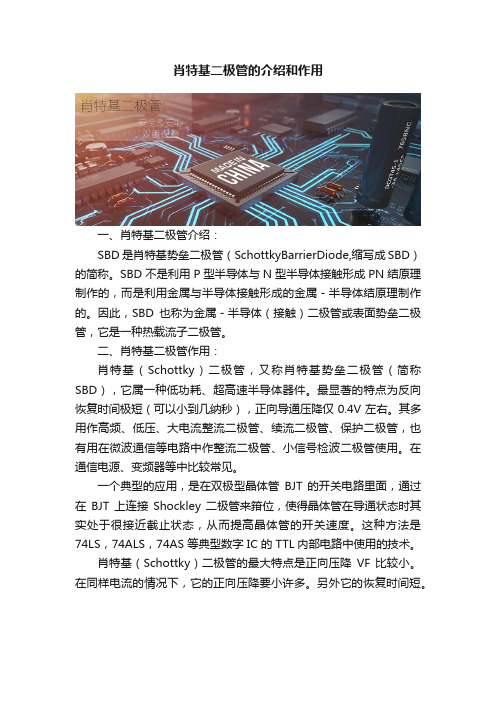
肖特基二极管的介绍和作用一、肖特基二极管介绍:SBD是肖特基势垒二极管(SchottkyBarrierDiode,缩写成SBD)的简称。
SBD不是利用P型半导体与N型半导体接触形成PN结原理制作的,而是利用金属与半导体接触形成的金属-半导体结原理制作的。
因此,SBD也称为金属-半导体(接触)二极管或表面势垒二极管,它是一种热载流子二极管。
二、肖特基二极管作用:肖特基(Schottky)二极管,又称肖特基势垒二极管(简称SBD),它属一种低功耗、超高速半导体器件。
最显著的特点为反向恢复时间极短(可以小到几纳秒),正向导通压降仅0.4V左右。
其多用作高频、低压、大电流整流二极管、续流二极管、保护二极管,也有用在微波通信等电路中作整流二极管、小信号检波二极管使用。
在通信电源、变频器等中比较常见。
一个典型的应用,是在双极型晶体管BJT 的开关电路里面,通过在BJT 上连接Shockley 二极管来箝位,使得晶体管在导通状态时其实处于很接近截止状态,从而提高晶体管的开关速度。
这种方法是74LS,74ALS,74AS 等典型数字 IC 的 TTL内部电路中使用的技术。
肖特基(Schottky)二极管的最大特点是正向压降VF 比较小。
在同样电流的情况下,它的正向压降要小许多。
另外它的恢复时间短。
三、肖特基二极管的特点:1)由于肖特基势垒高度低于PN结势垒高度,故其正向导通门限电压和正向压降都比PN结二极管低(约低0.2V)。
2)由于SBD是一种多数载流子导电器件,不存在少数载流子寿命和反向恢复问题。
SBD的反向恢复时间只是肖特基势垒电容的充、放电时间,完全不同于PN结二极管的反向恢复时间。
由于SBD的反向恢复电荷非常少,故开关速度非常快,开关损耗也特别小,尤其适合于高频应用。
3)它属一种低功耗、超高速半导体器件。
最显著的特点为反向恢复时间极短(可以小到几纳秒),正向导通压降仅0.4V左右。
肖特基(Schottky)二极管的最大特点是正向压降VF 比较小。
肖特基二极管特点

肖特基二极管特点肖特基二极管是一种非常重要的电子元器件,它具有许多独特的特点和优势。
下面将从结构、工作原理、性能等方面详细介绍肖特基二极管的特点。
一、结构特点肖特基二极管是由P型半导体和金属组成的,其结构与普通PN结二极管相似,但是由于P型半导体与金属之间没有外加掺杂,所以形成了一个具有双重势垒的结构。
这个双重势垒可以阻止大部分的载流子通过,从而实现了高速反向恢复和低反向漏电流。
二、工作原理当肖特基二极管处于正向偏置状态时,P型半导体中的空穴被注入到金属中,并被吸收或散射。
在这个过程中,电子被带到P型半导体中并与空穴复合。
这样就形成了一个类似于PN结二极管中形成的空间电荷区域。
当施加反向偏置时,由于没有外加掺杂,所以只有一个很小的反向漏电流。
三、性能特点1. 快速恢复时间由于肖特基二极管没有PN结中的扩散电容,所以能够实现非常快速的反向恢复,恢复时间通常在纳秒级别。
2. 低反向漏电流由于没有PN结中的少数载流子注入,肖特基二极管的反向漏电流非常低,可达到普通二极管的几个数量级以下。
3. 高温特性好由于肖特基二极管中没有PN结中的热激发效应,所以其在高温环境下表现出色。
此外,肖特基二极管还具有较好的抗辐射性能。
4. 低噪声由于肖特基二极管中没有PN结中存在的噪声源,所以其具有很低的噪声水平。
5. 适用频率范围广由于肖特基二极管快速恢复和低反向漏电流等优点,它可以被广泛应用于高频和微波领域。
四、应用领域1. 高速开关由于肖特基二极管具有快速恢复时间和低反向漏电流等优点,所以它被广泛应用于高速开关电路中。
例如:电源开关、PWM控制器等。
2. 低噪声放大器由于肖特基二极管具有低噪声和高频等优点,所以它被广泛应用于低噪声放大器中。
3. 微波控制电路由于肖特基二极管适用频率范围广,所以它被广泛应用于微波控制电路中。
例如:混频器、功率放大器等。
总之,肖特基二极管具有许多独特的优点和应用领域,是现代电子工业中不可或缺的重要元器件之一。
肖特基二极管速度

肖特基二极管速度肖特基二极管是一种特殊的二极管,具有快速的开关速度和低的反向恢复时间。
它的特殊结构和材料选择使其在高频电路和功率电子设备中得到广泛应用。
本文将从肖特基二极管的原理、特点、应用以及未来发展等方面进行介绍。
一、肖特基二极管的原理肖特基二极管是由半导体材料构成的,其结构类似于标准的PN结二极管,但是在P区和N区之间添加了一个金属层,形成了肖特基结。
这个肖特基结具有与标准PN结不同的特性,导致肖特基二极管具有更快的开关速度和更低的反向恢复时间。
肖特基二极管的工作原理是基于金属与半导体之间的肖特基势垒。
在正向偏置的情况下,电子从N区向P区扩散,空穴从P区向N区扩散,形成电流流动。
而在反向偏置的情况下,金属与N区之间的肖特基势垒会阻碍电子的扩散,从而减小了反向电流的大小。
二、肖特基二极管的特点1. 快速开关速度:由于肖特基二极管在正向偏置下具有较低的势垒高度,电子和空穴的注入和抽取速度更快,因此具有更快的开关速度。
这使得肖特基二极管在高频电路中能够更快地响应信号变化。
2. 低反向恢复时间:肖特基二极管在反向偏置下具有较低的反向电流,这是由于金属与半导体之间的肖特基势垒的形成。
这使得肖特基二极管的反向恢复时间更短,能够更快地从导通状态转换到截止状态。
3. 低功耗:肖特基二极管由于具有较低的反向电流和较快的开关速度,因此在工作过程中能够减少能量的损耗,从而实现低功耗的特点。
4. 高温稳定性:肖特基二极管的结构和材料选择使其具有较好的高温稳定性。
它能够在高温环境下保持较高的性能和可靠性,适用于高温工况下的应用。
三、肖特基二极管的应用1. 高频电路:肖特基二极管由于具有快速的开关速度和低的反向恢复时间,因此在高频电路中被广泛应用。
它可以作为高频信号的整流器、检波器和快速开关等元件,使得高频电路能够更好地工作。
2. 功率电子设备:肖特基二极管由于低功耗和高温稳定性的特点,适用于功率电子设备。
它可以作为电源开关、逆变器和变频器等元件,实现高效能的电能转换。
- 1、下载文档前请自行甄别文档内容的完整性,平台不提供额外的编辑、内容补充、找答案等附加服务。
- 2、"仅部分预览"的文档,不可在线预览部分如存在完整性等问题,可反馈申请退款(可完整预览的文档不适用该条件!)。
- 3、如文档侵犯您的权益,请联系客服反馈,我们会尽快为您处理(人工客服工作时间:9:00-18:30)。
肖特基二极管简介肖特基二极管(SBD)是肖特基势垒二极管(SchottkyBarrierDiode,缩写成SBD)的简称,是以其发明人肖特基博士(Schottky)命名的半导体器件。
肖特基二极管是低功耗、大电流、超高速半导体器件,它不是利用P型半导体与N型半导体接触形成PN结原理制作的,而是利用金属与半导体接触形成的金属-半导体结原理制作的。
因此,SBD也称为金属-半导体(接触)二极管或表面势垒二极管,它是一种热载流子二极管。
Schottky diode (SBD) is the Schottky barrier diode , is the inventor of the Schottky named semiconductor device. Schottky barrier diode is a low power, high current, super high speed semiconductor devices, instead of using P type semiconductor and the n-type semiconductor contact formation PN junction theory to make, but the use of metal semiconductor contact formation of metal semiconductor junction with the principle of making the. Therefore, SBD is also known as a metal semiconductor (contact) diode or a surface barrier diode, which is a hot carrier diode.肖特基二极管是半导体器件,以其发明人博士(1886年7月23日—1976年3月4日)命名的,SBD是肖特基势垒二极管(SchottkyBarrierDiode,缩写成SBD)的简称。
SBD不是利用P型半导体与N型半导体接触形成PN结原理制作的,而是利用金属与半导体接触形成的金属-半导体结原理制作的。
因此,SBD也称为金属-半导体(接触)二极管或表面势垒二极管,它是一种热载流子二极管。
肖特基二极管是问世的低功耗、大电流、超高速半导体器件。
其反向恢复时间极短(可以小到几纳秒),正向导通压降仅0.4V左右,而整流电流却可达到几千毫安。
这些优良特性是快恢复二极管所无法比拟的。
中、小功率肖特基整流二极管大多采用封装形式。
Schottky diode is a semiconductor device, which is named after its inventor (March 4, 1976 - July 23, 1886), SBD is the Schottky barrier diode (SchottkyBarrierDiode, abbreviated as SBD).SBD does not use the p-type semiconductor and the n-type semiconductor contact formation PN junction theory to make, but the use of metal semiconductor contact formation of metal semiconductor junction with the principle of making the. Therefore, SBD is also known as a metal semiconductor (contact) diode or a surface barrier diode, which is a hot carrier diode.Schottky diode is the advent of low power, high current, ultra high speed semiconductor devices. The reverse recovery time is very short, small toa few nanoseconds) and positive guide through pressure drop of only0.4%, and rectified current can reach thousands of Ma. These excellent properties are not comparable to the fast recovery diode. Medium and small power Schottky rectifier diodes are mostly used in package form.原理肖特基二极管是贵金属(金、银、铝、铂等)A为正极,以N型半导体B为负极,利用二者接触面上形成的势垒具有整流特性而制成的金属-半导体器件。
因为N型半导体中存在着大量的电子,贵金属中仅有极少量的自由电子,所以电子便从浓度高的B中向浓度低的A 中扩散。
显然,金属A中没有空穴,也就不存在空穴自A向B的扩散运动。
随着电子不断从B扩散到A,B表面电子浓度逐渐降低,表面电中性被破坏,于是就形成势垒,其电场方向为B→A。
但在该电场作用之下,A中的电子也会产生从A→B的漂移运动,从而消弱了由于扩散运动而形成的电场。
当建立起一定宽度的空间电荷区后,电场引起的电子漂移运动和浓度不同引起的电子扩散运动达到相对的平衡,便形成了肖特基势垒。
肖特基二极管工作原理典型的肖特基整流管的内部电路结构是以N型半导体为基片,在上面形成用砷作掺杂剂的N-外延层。
阳极使用钼或铝等材料制成阻档层。
用二氧化硅(SiO2)来消除边缘区域的电场,提高管子的耐压值。
N型基片具有很小的通态电阻,其掺杂浓度较H-层要高100%倍。
在基片下边形成N+阴极层,其作用是减小阴极的接触电阻。
通过调整结构参数,N 型基片和阳极金属之间便形成肖特基势垒,如图所示。
当在肖特基势垒两端加上正向偏压(阳极金属接电源正极,N型基片接电源负极)时,肖特基势垒层变窄,其内阻变小;反之,若在肖特基势垒两端加上反向偏压时,肖特基势垒层则变宽,其内阻变大。
综上所述,肖特基整流管的结构原理与PN结整流管有很大的区别通常将PN结整流管称作结整流管,而把金属-半导管整流管叫作肖特基整流管,采用硅平面工艺制造的铝硅肖特基二极管也已问世,这不仅可节省贵金属,大幅度降低成本,还改善了参数的一致性。
Schottky diode is a metal semiconductor device, which is formed on the surface of the two electrode, which is made of N (B) A as the cathode, and the potential barrier is formed on the contact surface. Because there are a lot of electrons in the N type semiconductor, there is only a very small amount of free electrons in the precious metal, so the electron diffusion from the B to the low concentration of A. It is clear that there is no hole in the metal A, and there is no diffusion motion of the hole from the A to the B. With the electrons from B to A, the surface electron concentration of B gradually decreases, the surface of the neutral isdestroyed, so the barrier is formed, and the electric field direction is A > B. But under the action of electric field, the electrons in a will produce drift movement from a to B, thus weaken the due to diffusive motion and the formation of the electric field. When the space charge region of a certain width is set up, the electron drift caused by the electric field and the concentration of the electron diffusion motion caused by the different concentration of the electric field can reach the equilibrium, and Schottky barrier.The internal circuit structure of the Schottky diode is typical of the internal structure of the Schottky rectifier tube is a N type semiconductor as the substrate, and the formation of the N- epitaxial layer is formed on the surface of arsenic. The anode is made of a material such as molybdenum or aluminum. Using silicon dioxide (SiO2) to remove the electric field in the edge region and increase the pressure value of the tube. The H- type substrate has a very small on state resistance, and the doping concentration is 100% times higher than that of the N layer. The N+ cathode layer is formed on the base plate, which is to reduce the contact resistance of the cathode. By adjusting the structural parameters, the Schottky barrier is formed between the N and the anode metal, as shown in fig.. When in the Schottky barrier at both ends with forward bias (metal anode is connected to the positive pole, n-type substrate connected with the cathode of the power supply), Schottky barrier layer narrows, the resistance becomes smaller; on the contrary, if the Schottkybarrier at both ends and when a reverse bias voltage, Schottky barrier layer is wider, the resistance becomes large. In summary, Schottky rectifier structure principle and PN junction rectifier tube has great difference will usually PN junction rectifier tube called a junction rectifier tube, and the metal - semiconductor tube rectifier tube called Schottky rectifier tube, using planar silicon manufacturing process of Aluminum Silicon Schottky diode is also available, which not only can save precious metals, substantially reduce costs, but also improves the consistency of parameter.特点SBD的主要优点包括两个方面:肖特基二极管1)由于肖特基势垒高度低于PN结势垒高度,故其正向导通门限电压和正向压降都比PN 结二极管低(约低0.2V)。
